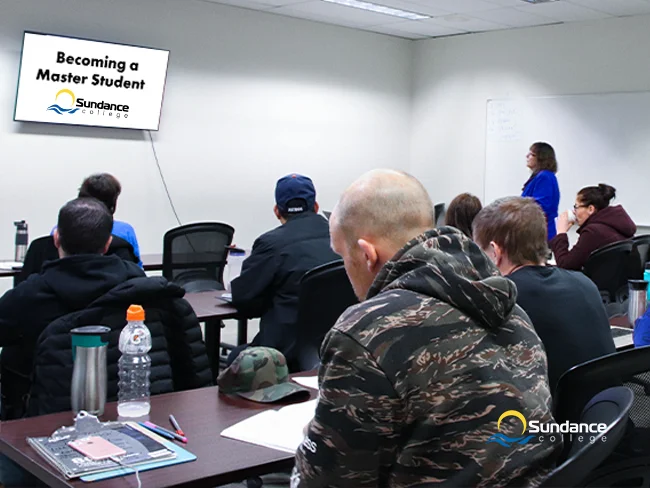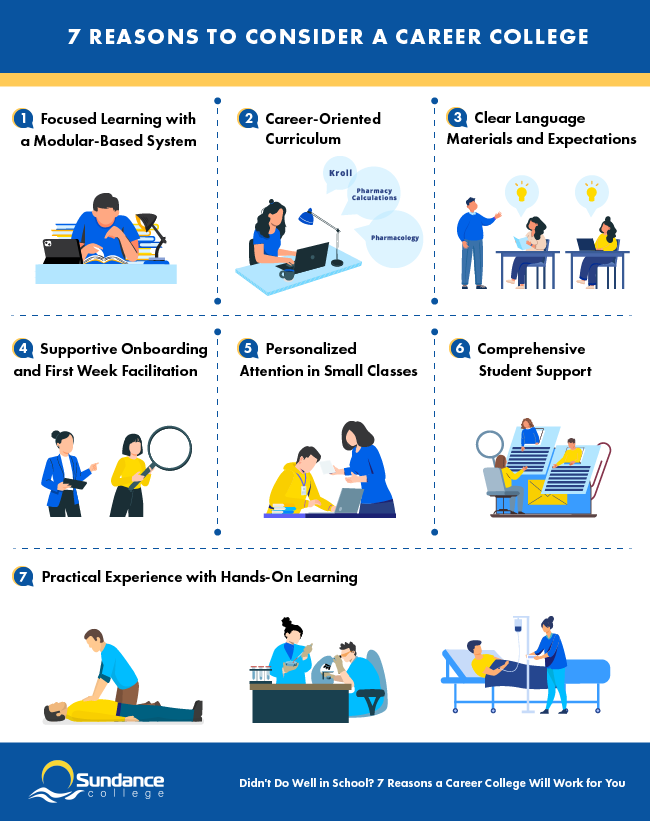Blog / Didn’t Do Well in School? 7 Reasons a Career College Will Work for You
Didn’t Do Well in School? 7 Reasons a Career College Will Work for You

Explore our Diploma Programs
- Business, Hospitality, and Legal
- Health and Human Services
- Technology
Table of Contents
Did you struggle in high school? Are you worried that your past academic performance might hold you back from a successful career change? You’re not alone.
At career colleges, many students have shared the same worries before taking their first step towards a brighter future. For example, Hananeel C., a graduate of Sundance College’s Digital Marketing and Social Media Management program, found his apprehension transformed into confidence through the hands-on, career-focused training he received:
“In high school, I wasn’t the best student, so I was a little apprehensive about enrolling in Sundance College. However, my career college program has given me the knowledge and skills I need to succeed. The hands-on digital marketing classes, especially projects like building and auditing a website and writing for business, gave me confidence as my instructor, with real-world marketing experience, validated my work.”
Takeaway: High school performance doesn’t have to define your future! Career-focused programs and supportive environment are specifically designed by some career colleges to help you gain the skills, confidence, and qualifications to succeed, regardless of your past academic challenges.
In this article, you’ll explore seven reasons why you can succeed at a career college, even if your high school experience wasn’t the best.
Listen to “Didn’t Do Well in School? 7 Reasons a Career College Will Work for You”
1. Focused Learning with a Modular-Based System
Do you remember juggling 4-5 subjects at once in high school, some of which were completely unrelated to your personal interests?
Some career colleges use a modular-based learning system that allows students to focus on one subject at a time. This structured approach helps students gain confidence as they thoroughly understand each topic before moving on.
For example, at Sundance College, students progress through programs step-by-step, reducing the stress of juggling multiple subjects and making learning more manageable for those returning to education.
2. Career-Oriented Curriculum
Think back to your high school classes. How many of them seemed relevant to your future career? For example, if you dreamed of working in healthcare, you might have struggled to see the point of studying subjects like art, history, and even geography.
Career colleges can take a different approach. Certain career colleges feature a curriculum designed by industry-experienced professionals with direct career paths in mind. At Sundance College, for example, if you’re a Pharmacy Assistant program student, you’ll dive straight into courses like Pharmaceutical Software – Kroll, Pharmacy Calculations, and Pharmacology.
Every lesson and assignment is geared towards equipping you with practical skills relevant to the job market you want to enter. This career-oriented curriculum makes it so that what you learn is immediately applicable to your future job.
3. Clear Language Materials and Expectations
Have you ever been confused by complicated textbooks or unclear assignments at school? For many students, this has been a big challenge, especially for ESL learners, those who struggled with reading and writing, or newcomers to the country.
Some career colleges aim to simplify learning with clear language materials and transparent expectations. At Sundance College, many of our students are immigrants or non-native English speakers who need materials that are easy to read and well-structured to help them gain that sought-after Canadian qualification.
This approach helps eliminate confusion and allows students to concentrate on their studies without unnecessary stress. Whether you’re learning medical terminology in the Medical Office Administration program, or understanding accounting software in the Accounting, Tax, and Payroll program, straightforward instructions and concise materials mean you can focus on developing the job-ready skills you need for your future career.
4. Supportive Onboarding and First Week Facilitation

Do you remember your first day of school as a child; how different each new classmate was to the next? Some knew the alphabet, some could even read a couple of words already, some were good at drawing, and some just wanted to have fun with no interest in studies at all!
The same thing happens in college — students come from diverse educational backgrounds with varying learning styles, academic preferences, and levels of tech-savviness.
Sundance College, as an example, prioritizes supportive onboarding and first-week support to help you settle in seamlessly and understand the college environment.
For example, during your orientation session, ‘Becoming a Master Student’, at Sundance College, you’ll have the chance to:
- Connect with your fellow students, instructors, and the broader college community.
- Learn about the student resources available, understand college culture, and start building valuable relationships.
- Explore the college resources at your disposal, including on-campus facilities, online databases, and college life support services.
- Ask questions about your courses, expectations, and academic support. Seek guidance on how to approach your studies effectively.
This proactive approach enables you to feel welcomed and informed right from the start, setting you up for a successful educational journey.
5. Personalized Attention in Small Classes
In high school, large class sizes often meant struggling to get noticed or having questions go unanswered.
With deliberately small class sizes, career colleges like Sundance offer personalized attention from instructors who are dedicated to students’ learning success. This personalized approach fosters a supportive learning environment where students’ individual needs are recognized and addressed.
Whether you need extra help understanding a concept or want to explore a topic in more depth, your instructors are there to provide guidance and support. This focused attention helps you reach academic success, excel in your studies, and achieve your long-term career goals.
6. Comprehensive Student Support
Beyond academics, some career colleges offer extensive support services that cater to your holistic professional development.
Career colleges can be designed to provide students with the resources they need to succeed, offering support that goes beyond academics to address professional development, personal well-being, and career-readiness. These services help students balance their education with other responsibilities and build confidence as they work towards their goals.
Take Sundance College, for example. Support begins the moment you inquire about a program. Admissions advisors guide students in exploring programs that align with their career goals to make sure you feel confident in your decision. Once enrolled, instructors and student services provide personalized guidance and flexible learning options to fit busy schedules, whether online or on-campus.
Personal well-being is also a priority. Students have access to financial aid guidance and resources like GuardMe, a Mental Wellness Student Support Program offering 24/7 access to mental health services. This allows students to feel supported both academically and emotionally throughout their studies.
Career readiness is another key focus. Services like resume building, interview preparation, and practicum placements help students transition successfully into the workforce. In fact, many students secure job offers through their practicum experiences, thanks to strong industry connections built through their programs.
7. Practical Experience with Hands-On Learning
In high school, learning often revolves around textbooks and lectures, with limited opportunities for hands-on experience. Some career colleges offer a different approach, emphasizing practical experience that goes beyond theory.
Career colleges like Sundance College prioritize hands-on learning through the theoretical part of the diploma programs as well as through practical work placements in real-world settings. This way, students not only understand concepts but also gain practical skills directly applicable to their career paths.
Sundance College’s commitment to hands-on learning is evident in our specialized facilities and resources designed to enhance your practical skills. Here’s a glimpse of what we offer:
- Pharmacy and personal support worker laboratories
- Interactive training simulators
- Learning centers
These resources are available both online or at our campuses in Calgary, Edmonton, and Winnipeg, making sure all students receive comprehensive hands-on training regardless of their learning environment.

Reap the Benefits of Sundance College for Your Career Success
Focused learning, career-oriented curriculum, clear materials, supportive onboarding, personalized attention, comprehensive support, and hands-on experience — these seven reasons demonstrate why career colleges are ideal for people like you who might not have excelled in a traditional high school setting but want to build a strong foundation to enter the workforce or advance their careers.
At Sundance College, you can choose from various diploma programs tailored for:
Explore them, and once you choose the field, don’t hesitate to reach out to us, because:
“For someone who is thinking about going back to school and considering Sundance, I’d say 100%. Go for it. Just do it. I’m 42 years old, and I was so anxious and nervous about going back to school. And honestly, it’s been probably the best learning experience of my life, and I’m so grateful for everyone here.”
– Robert S., Sundance Addictions and Community Health Professional graduate
Book a tour today to explore Sundance College’s facilities, hands-on learning resources, and supportive community. They are all designed to prepare students for successful careers in tech, healthcare, or business.
Subscribe for more career advice
Blog Categories
Share on:
